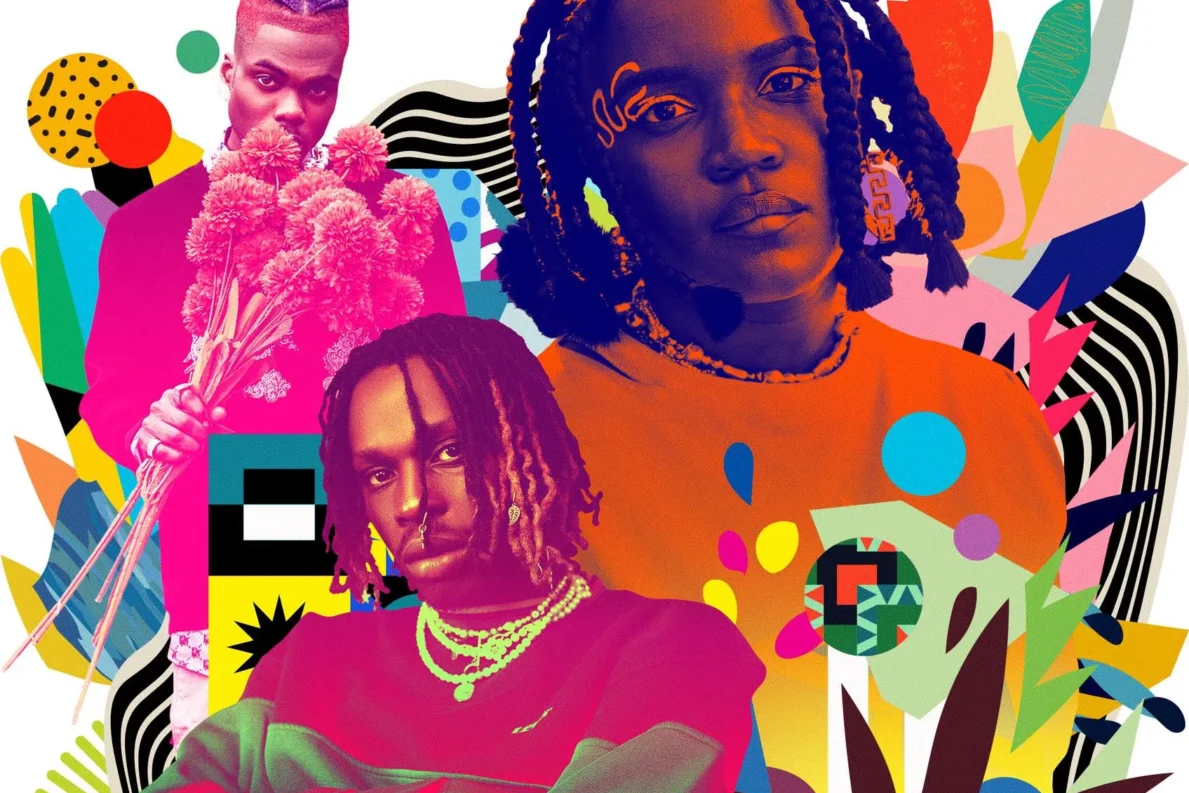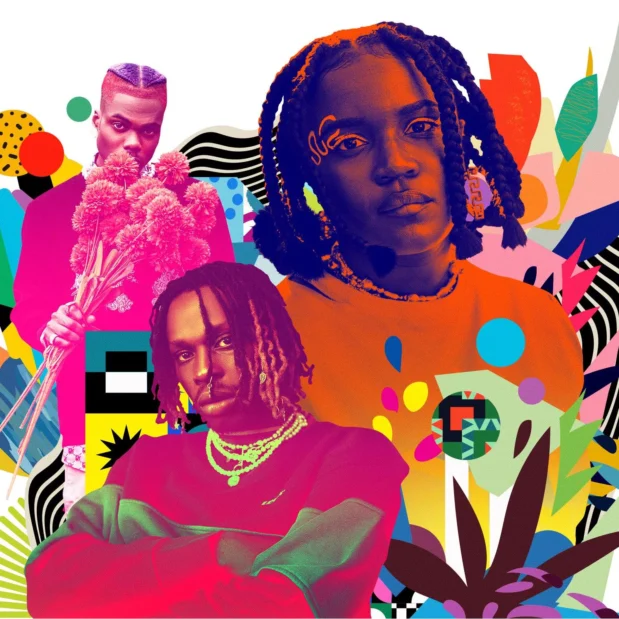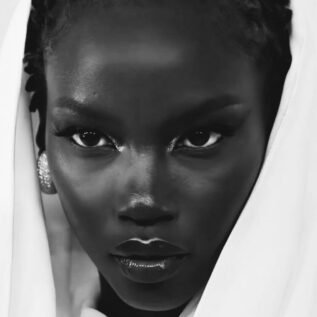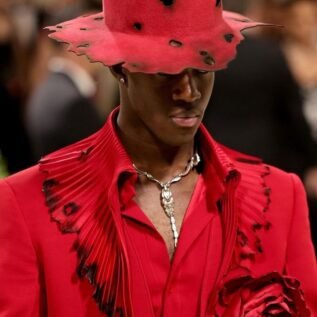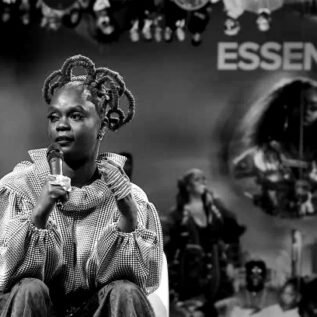Although Afrobeat and Afrobeats are distinct, with the former being more political and the latter more mainstream and diverse, Fela Kuti’s influence remains unmistakable.
★AFROVOGUE
Origins and Evolution

Afrobeats, a genre that is currently taking the global pop music stage by storm, has roots deeply embedded in traditional African music forms. Tracing its lineage back to the mid-20th century, the genre draws profoundly from highlife and juju, which are prevalent music styles in West Africa. Highlife, known for its jazzy horns and multiple guitars, laid the foundation for rhythmic complexity, while juju incorporated traditional Yoruba percussion and vocal styles, establishing a fusion that would ultimately pave the way for Afrobeats.
A critical figure in the evolution of what we now recognize as Afrobeats is Fela Kuti, an iconic Nigerian musician whose Afrobeat style in the 1970s wove together traditional African melodies, jazz, funk, and Ghanaian highlife. His pioneering sound was characterized by extensive instrumentals, rhythmic patterns, and socially conscious lyrics, setting a blueprint for subsequent generations. Although Afrobeat and Afrobeats are distinct, with the former being more political and the latter more mainstream and diverse, Fela Kuti’s influence remains unmistakable.
Fast forward to the contemporary scene, Afrobeats has evolved significantly, integrating elements of hip-hop, dancehall, and electronic music, making it an eclectic and dynamic genre. Artists like Wizkid, Burna Boy, and Davido have been at the forefront of this evolution, bringing a modernized sound that includes syncretic instrumentation, digital production techniques, and a global appeal. Notably, Burna Boy’s infusion of Afrobeat into his music has even led to Grammy recognition, illustrating the genre’s substantial global footprint.
The modern Afrobeats movement reflects not only an evolution of sound but also a transformation in lyrical themes. Earlier compositions, often reflective of socio-political issues akin to those from Fela Kuti, have broadened to encompass love, celebration, and resilience, evident in tracks like Rema’s “Calm Down.” This diversity has widened the genre’s appeal, garnering substantial attention from international audiences and platforms such as Okay Africa and AfroBillboard, PLAe etc.
Thus, the evolution of Afrobeats encapsulates a rich history of musical influences, instrumental advancements, and thematic expansions. This legacy, from its humble beginnings to its current prominence, paints a vibrant picture of African artistry’s impact on the global entertainment landscape.
Key Artists and Their Impact

Afrobeats, a genre deeply rooted in African music traditions, has seen a significant rise in global popularity. This surge can be attributed to the efforts of both pioneering figures and contemporary artists. Among the most influential early contributors is Fela Kuti, an iconic musician whose innovative fusion of jazz, funk, and traditional African rhythms laid the groundwork for Afrobeats. Alongside Kuti, Tony Allen, his drummer, played a crucial role in defining the genre’s sound with complex drum patterns and intricate grooves that became the heartbeat of Afrobeats.
Building on the legacy of these pioneers, contemporary artists such as Wizkid, Burna Boy, and Davido have propelled Afrobeats to new heights. Wizkid, for instance, has been instrumental in introducing Afrobeats to a global audience. His collaborations with international stars like Drake on the hit song “One Dance” demonstrated the genre’s crossover appeal. Similarly, Burna Boy’s unique blend of Afrobeat, dancehall, and reggae has captivated listeners worldwide, earning him critical acclaim and a Grammy award for his album “Twice as Tall.” These achievements have not only spotlighted Burna Boy but also underscored Afrobeats’ growing influence on the global music stage.
Davido, another key figure in the Afrobeats scene, has also made significant strides internationally. His music, which often features a mix of traditional African sounds and contemporary pop elements, has earned him a substantial following. International collaborations with artists like Chris Brown and Young Thug have further cemented his status as a global Afrobeats ambassador. These collaborations highlight the genre’s versatility and its ability to seamlessly integrate with diverse musical styles.
The continual evolution of Afrobeats through these key artists has resonated with global audiences, making it a staple in contemporary music. Their contributions have not only elevated the genre but have also brought African music and entertainment to the forefront of the international scene.
Mainstream Success and Global Recognition

Afrobeats has undeniably ascended to impressive heights on the global music stage, earning both critical acclaim and popular recognition. Over the past decade, the genre has witnessed an unprecedented breakthrough into mainstream music hubs, elevating African artists to global icons. This momentum was marked notably by the achievements of phenomenons like Burna Boy and Wizkid, who have not only topped global music charts but also secured prestigious awards and nominations.
Burna Boy’s album, “Twice as Tall,” emerged as a cultural milestone, clinching the Grammy Award for Best Global Music Album in 2021. This victory signifies the genre’s expanding footprint and the increasing readiness of global platforms to celebrate African music. Wizkid’s collaboration with Beyoncé on the track “Brown Skin Girl” further exemplifies this trend, earning accolades at various international award ceremonies and underscoring Afrobeats’ mainstream appeal.
Chart success has also been a critical element of Afrobeats’ worldwide recognition. Songs like Rema’s “Calm Down” and Davido’s “Fall” have seamlessly infiltrated international music charts, resonating with audiences beyond African borders. These tracks have garnered billions of streams, illustrating the genre’s universal appeal and signaling a transformative era for African entertainment. Similarly, Afrobeats’ infectious rhythms have inspired global musical trends, prominently influencing contemporary sounds like Amapiano.
Memorable performances on notable stages further highlight the genre’s global reception. Burna Boy’s energetic showcases at events such as the Coachella Valley Music and Arts Festival, alongside Wizkid’s sold-out performances at the O2 Arena, emphasize the genre’s widespread appeal and the growing fanbase of African music worldwide. These performances not only showcase the vibrant culture and artistic innovation behind Afrobeats, but they also mark a significant shift in global pop norms.
With the support of platforms like Okay Africa and Afrobilboard, Afrobeats continues to make strides in integrating African music into the global entertainment narrative. The genre’s trailblazing progress enriches the global music scene, promising a dynamic future for Nigerian music and beyond.
Cultural Influence and Representation

Afrobeats is more than just a musical genre; it serves as an authentic medium for cultural representation and pride, carrying the essence of Africa to audiences globally. It is a dynamic fusion of traditional African rhythms with contemporary elements, creating a sound that is both unique and universally appealing. Acts such as Burna Boy and Wizkid are at the forefront of this movement, utilizing Afrobeats to promote African cultures and narratives worldwide.
The influence of Afrobeats extends beyond music to other cultural facets like fashion, dance, and language. Fashion icons and designers are increasingly drawing inspiration from African aesthetics, incorporating vibrant prints and traditional motifs into global fashion runways. Artists like Davido and Rema have popularized Afro-centric styles, making them a staple in wardrobes around the world.
Dance, an inseparable element of Afrobeats, also plays a significant role in its cultural representation. Energetic dance moves and routines from African territories have become viral sensations on social media platforms like TikTok and Instagram. These dances, often synchronized with pulsating Afrobeats tracks, reflect the energetic and diverse spirit of African entertainment.
Language, too, has seen a reciprocal influence. Lyrics in Afrobeats songs often blend English with local vernaculars, introducing global listeners to phrases and expressions from various African languages. This linguistic exchange not only enriches the listener’s experience but also serves to dismantle stereotypes, portraying a more nuanced and interconnected African identity.
Moreover, Afrobeats acts as a vehicle for African narratives, focusing on themes that resonate with the continent’s socio-political landscape. Through their music, artists like Fela Kuti have historically challenged political injustices, while contemporary artists continue to address topical issues, amplifying African voices on global platforms. The success of Nigerian music at prestigious award ceremonies, such as the Grammys, further underscores this growing recognition.
In summation, Afrobeats is instrumental in showcasing Africa’s vibrant cultures to the world, helping to challenge and redefine existing stereotypes. Its pervasive influence in fashion, dance, and language fosters a greater understanding and appreciation for the diversity and richness of African heritage.
Innovations and Technological Advances

The ascent of Afrobeats into the global pop music stage has been greatly influenced by various innovations and technological advancements. One of the most significant drivers is the proliferation of social media platforms. Through platforms such as Instagram, Twitter, and TikTok, artists like Wizkid and Burna Boy have crafted international followings, extending their reach beyond traditional geographical boundaries. These platforms allow artists to engage directly with fans, promote their music, and build a community that fuels their global success.
Furthermore, streaming platforms such as Spotify, Apple Music, and YouTube have revolutionized how audiences consume music, providing an accessible and democratic arena for Afrobeats to thrive. By appearing on curated playlists and topping charts, artists from the African entertainment scene gain visibility and access to new listener bases. Nigerian music stars like Davido have seen exponential growth in their global fanbase, facilitated largely by these streaming services. This seamless distribution model bypasses the limitations of physical album sales, making it easier for artists to distribute their music worldwide.
Music production software has also played a pivotal role in the rise of Afrobeats. In modern studios, artists and producers can experiment with different sounds and collaborations, pushing the genre’s boundaries. The use of sophisticated software allows for high-quality production that competes on the international stage. This technological edge has enabled artists to bring innovative sounds to mainstream audiences, showcasing the versatility of Afrobeats.
International collaborations have seen a surge as well, facilitated by technological advancements. Programs and platforms simplify the process of working with artists across the globe. This cross-pollination of musical styles merges Afrobeats with other genres, enriching its repertoire and inviting a diverse range of listeners. Platforms like Okay Africa and Afrobillboard have become instrumental in promoting these cross-border collaborations, further cementing Afrobeats’ place in global pop culture.
In summary, the confluence of social media, streaming platforms, and advanced music production technologies has been instrumental in propelling Afrobeats into the global spotlight. These tools have not only expanded the reach of African music but also allowed for greater artistic innovation and international collaboration within the genre.

The era of Afrobeats has been markedly characterized by a significant uptick in cross-genre collaborations, substantially elevating the genre’s presence on the global music stage. One of the earliest notable collaborations was between Wizkid and Drake on the track “One Dance,” which not only earned widespread acclaim but also introduced Afrobeats to a broader international audience. This watershed moment paved the way for additional partnerships between Afrobeats artists and luminaries from various genres such as hip-hop, pop, and R&B.
Afrobeats blends traditional African rhythms with contemporary musical elements, making it a versatile genre ripe for experimentation and fusion. The collaboration between Burna Boy and American singer-songwriter Sam Smith on “My Oasis” demonstrates this versatility. By combining Burna Boy’s rich Afrobeats sound with Smith’s emotive pop sensibility, the track bridges cultural and sonic gaps, thereby expanding Afrobeats’ appeal across different listener demographics.
The fusion of Afrobeats with hip-hop has been particularly influential. The synergy between Afrobeats artists like Davido and hip-hop icon Nas on the song “Birthday Cake” showcases how these collaborations can produce a fresh, innovative sound that resonates with fans of both genres. This cross-pollination further solidifies Afrobeats’ foothold in the mainstream music landscape, encouraging more artists to explore such synergistic musical ventures.
Cross-genre collaborations are not merely limited to high-profile artists; they also foster grassroots movements within the music industry. Emerging talents like Rema, known for his hit “Calm Down,” have successfully teamed up with prominent international acts, contributing to the new wave of Afrobeats’ popularity. Whether it’s a chart-topping track or a viral sensation, these partnerships underscore the genre’s adaptability and its capacity to weave various musical styles into a coherent tapestry of sound.
The growing number of collaborations has indeed expanded the reach of Afrobeats, offering broader exposure and facilitating cultural exchange. Such artistic alliances are pivotal in cementing Afrobeats’ status as a dominant force in global music entertainment. As the genre continues to evolve, the cross-genre fusion enriches the musical landscape, bringing diverse audiences together and amplifying African music’s diverse and dynamic nature.
The Future of Afrobeats

The future of Afrobeats is poised to be as vibrant and dynamic as its rich past. With the genre’s relentless rise on the global music stage, catalyzed by artists like Wizkid, Burna Boy, and Davido, Afrobeats is set to continue its ascension, breaking new boundaries and redefining African entertainment.
Current trends indicate a greater fusion of Afrobeats with other global music styles. Amapiano, a house music genre from South Africa, has already started merging with Afrobeats, creating a seamless blend that is captivating international audiences. This merger signals a potential future where Afrobeats becomes a versatile canvas for various musical experimentations.
Emerging artists like Rema, whose hit song “Calm Down” has garnered massive streams, are introducing fresh sounds and innovative approaches within Afrobeats, ensuring the genre’s evolution remains robust. Furthermore, collaborations with global music icons are expected to increase, providing Afrobeats artists access to larger platforms and diverse audiences. The influence of renowned figures like Fela Kuti remains ever-present, inspiring new generations to blend socio-political commentary with compelling rhythms.
Shifts in musical style will likely reflect the growing influence of technology and modernization. Producers and artists are increasingly leveraging advanced audio technologies to enhance their soundscapes, resulting in more polished and universally appealing tracks. Additionally, Afrobeats’ infectious rhythms are shaping the sounds of mainstream pop, revealing a deeper integration with the global music industry.
Moreover, the global music industry’s evolving landscape, particularly the significance of awards such as the Grammys, has highlighted Afrobeats on an international platform. This recognition not only elevates the genre’s prestige but also sets a precedent for future African music styles to gain similar accolades. Platforms like OkayAfrica and Afro Billboard are becoming pivotal in promoting and celebrating African music, thus fostering a thriving ecosystem for Afrobeats and its artists.
The fusion of rich cultural roots with modern innovations, coupled with increased global recognition, ensures that Afrobeats will remain a cornerstone of the music industry, continuously shaping and being shaped by the diverse tapestry of global sounds.
Afrobeats as a Global Force

Afrobeats has indubitably cemented its place on the global pop music stage, evolving from a niche genre to a worldwide phenomenon. This remarkable journey began with trailblazers like Fela Kuti, who set the foundational rhythms and political undertones that would later define the essence of Afrobeats. Over the past decade, contemporary stars such as Burna Boy, Wizkid, and Davido have taken this genre to unprecedented heights, further embedding African music into the global mainstream.
Significant milestones in Afrobeats’ global ascent include Burna Boy’s Grammy win and multiple nominations for his albums, as well as Wizkid’s collaborations with international artists and performances on prominent stages such as Coachella. The incorporation of Afrobeats elements in mainstream tracks, like Rema’s “Calm Down” achieving substantial international success, also underscores the genre’s growing influence. Additionally, platforms like OkayAfrica and AfroBillboard have played crucial roles in promoting African entertainment and amplifying the voices of Afrobeats artists.
Afrobeats’ impact extends beyond music; it contributes significantly to cultural diplomacy, offering a vibrant lens through which global audiences engage with African stories, aspirations, and expressions. The genre’s intricate rhythms, catchy hooks, and compelling narratives provide a unique blend that resonates universally, making Afrobeats a cultural ambassador for Africa. The collaboration between Afrobeats and other global genres, such as Amapiano, has further enriched the global music lanscape, demonstrating the genre’s versatility and adaptability.
With its roots deeply embedded in Nigerian music and its branches reaching out globally, Afrobeats continues to chart an inspiring trajectory. As the genre garners more recognition and accolades, its potential for further growth and influence seems boundless. The phenomenon of Afrobeats marks not just a musical revolution but a significant cultural moment, heralding a new era where African music stands proudly on the global stage, influencing and shaping contemporary music trends.



